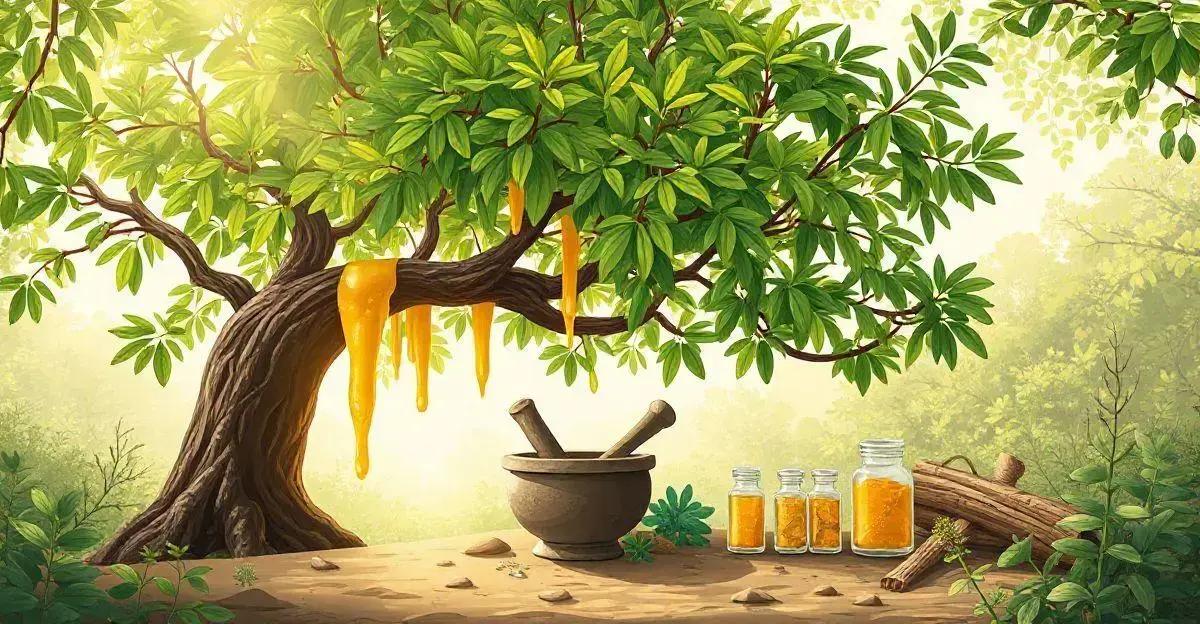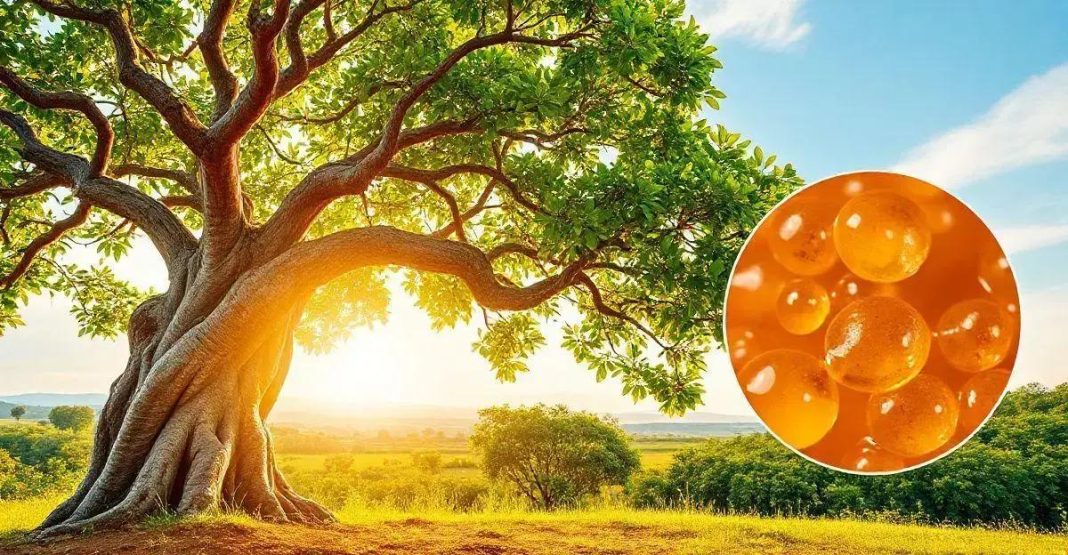The Boswellia serrata tree, commonly known as the frankincense tree, is renowned for its resin, which has significant health benefits, particularly in traditional Ayurvedic medicine for its anti-inflammatory effects and support for joint and respiratory health. Ongoing research is investigating its potential in treating various health issues, including cancer and neurological disorders. Sustainable sourcing of Boswellia products is crucial for conservation efforts, allowing consumers to enjoy its benefits while supporting the tree’s preservation for future generations.
The Boswellia serrata tree, also known as the frankincense tree, has been revered for centuries for its medicinal properties. This remarkable tree produces a resin that has been used in traditional medicine to treat various ailments. In this article, we will uncover the amazing benefits of the Boswellia serrata tree and how its resin can contribute to your health and well-being.
Origins and Habitat of Boswellia Serrata
The Boswellia serrata tree, commonly known as the frankincense tree, is native to the arid regions of the Indian subcontinent, particularly in countries like India, Nepal, and parts of the Middle East. This resilient tree thrives in dry, rocky soils and is often found in hilly or mountainous terrains where the climate is hot and dry.
Boswellia serrata typically grows to a height of 3 to 5 meters and features a gnarled trunk with smooth bark. The tree’s leaves are compound, with small leaflets that provide a lush green contrast to its rugged surroundings. One of the most remarkable aspects of the Boswellia serrata tree is its ability to withstand harsh environmental conditions, making it a symbol of resilience.
The tree produces a fragrant resin, which is harvested by making incisions in the bark. This resin, known for its aromatic properties, has been collected for thousands of years, traditionally used in religious ceremonies, incense, and for medicinal purposes. The harvesting process is done carefully to ensure the tree remains healthy and continues to produce resin over time.
In summary, the origins and habitat of the Boswellia serrata tree highlight its adaptability and significance in various cultures, particularly for its resin, which has been valued for both its fragrance and its health benefits.

Traditional Uses in Medicine
The Boswellia serrata tree has a long history of use in traditional medicine, particularly within Ayurvedic practices in India.
The resin obtained from this tree, known as frankincense, has been utilized for its therapeutic properties for thousands of years. Traditionally, it has been used to treat a variety of ailments, ranging from inflammatory conditions to digestive issues.
In Ayurvedic medicine, Boswellia serrata is highly regarded for its anti-inflammatory and analgesic properties. It has been commonly prescribed for conditions such as arthritis, asthma, and other inflammatory diseases. The resin is believed to help reduce swelling and pain, making it a popular natural remedy for joint health.
Additionally, frankincense has been used in traditional practices for its calming effects. The resin is often burned as incense during meditation and spiritual rituals, as it is thought to promote peace and tranquility, enhance emotional well-being, and aid in mental clarity.
Moreover, Boswellia serrata has been employed to support respiratory health. It is traditionally used to relieve symptoms of cough and bronchial inflammation, making it beneficial for those suffering from respiratory conditions.
In summary, the traditional uses of Boswellia serrata in medicine illustrate its versatility and effectiveness, making it a respected natural remedy in various healing practices across cultures.
Health Benefits of Boswellia Resin
Boswellia resin, derived from the Boswellia serrata tree, is celebrated for its numerous health benefits, which have been recognized in both traditional and modern medicine.
One of the most notable aspects of Boswellia resin is its potent anti-inflammatory properties. Research has shown that the active compounds, particularly boswellic acids, can inhibit inflammatory enzymes, making it effective in managing conditions such as arthritis and inflammatory bowel disease.
Additionally, Boswellia resin supports joint health by reducing pain and stiffness. Many individuals with osteoarthritis report significant relief from symptoms when using Boswellia, leading to improved mobility and quality of life.
Furthermore, Boswellia resin is known to enhance respiratory function. It can help alleviate symptoms associated with asthma and bronchitis by reducing inflammation in the airways, making breathing easier for those with respiratory issues.
The resin also promotes digestive health. Its anti-inflammatory effects can soothe the gastrointestinal tract, aiding in the management of conditions like Crohn’s disease and ulcerative colitis, providing relief from abdominal pain and discomfort.
Moreover, Boswellia resin exhibits immune-boosting properties. By modulating the immune response and reducing chronic inflammation, it helps the body fend off infections and maintain overall health.
In summary, the health benefits of Boswellia resin make it a powerful natural remedy, supporting a wide range of health concerns and contributing to overall well-being.

How to Use Boswellia Serrata Products
Using Boswellia serrata products can be a great way to harness the numerous health benefits associated with this remarkable tree. Here are some common forms of Boswellia and tips on how to use them effectively:
1. Capsules and Tablets: Boswellia is commonly available in capsule or tablet form, which makes it easy to incorporate into your daily routine. Follow the dosage instructions on the product label or consult a healthcare professional for guidance on the appropriate amount for your needs.
2. Powder: Boswellia resin powder can be mixed with water, smoothies, or yogurt for easy consumption. This form allows for flexible dosing, and you can adjust the amount based on your health goals. Aim for about 1 to 2 grams per day, but it’s best to start with a lower dose and gradually increase as needed.
3. Tinctures: Boswellia tinctures are liquid extracts that can be taken directly or added to beverages. Follow the recommended dosage on the label, usually ranging from 20 to 30 drops per day. Tinctures are a concentrated form, so they may provide quicker absorption into the bloodstream.
4. Topical Applications: Boswellia is also available in creams or balms, which can be applied directly to sore joints or inflamed areas. These topical applications can provide localized relief and are great for addressing specific pain points.
5. Essential Oil: Boswellia essential oil can be used in aromatherapy or diluted with a carrier oil for topical use. It can help promote relaxation and reduce stress. When using essential oils, always perform a patch test to check for skin sensitivity.
Incorporating Boswellia serrata products into your wellness routine can be beneficial for overall health. However, it’s essential to consult with a healthcare professional before starting any new supplement, especially if you have pre-existing conditions or are taking other medications.
Sustainability and Conservation
As the demand for Boswellia serrata resin continues to grow due to its health benefits, the sustainability and conservation of the Boswellia serrata tree has become an important topic. Overharvesting and unsustainable harvesting practices can threaten the long-term viability of this valuable tree species.
The Boswellia serrata tree is primarily found in arid regions of India, Nepal, and parts of the Middle East. It thrives in harsh climates and rocky terrains, but it is vital that harvesting practices protect the tree and its ecosystem. Sustainable harvesting involves making careful incisions in the bark to collect resin without harming the tree. This method allows the tree to continue producing resin for future harvests.
Organizations and local communities are increasingly recognizing the importance of sustainable practices to preserve Boswellia trees and their habitats. Initiatives such as reforestation and the establishment of protected areas are being implemented to ensure that Boswellia serrata populations remain healthy and abundant.
Moreover, consumers can play a role in promoting sustainability by choosing Boswellia products that are certified as sustainably sourced. Look for brands that prioritize ethical harvesting practices and support local communities involved in the collection of Boswellia resin.
In summary, the sustainability and conservation of the Boswellia serrata tree are crucial for maintaining its availability for future generations. By supporting sustainable practices and being mindful of product sourcing, we can help protect this remarkable tree and the benefits it provides.

Future Research and Potential Uses
The future of Boswellia serrata research is promising, with ongoing studies aimed at uncovering more about its health benefits and potential uses.
As interest in natural remedies grows, scientists are increasingly focusing on the therapeutic applications of Boswellia serrata resin and its active compounds.
One area of research is exploring the anti-cancer properties of Boswellia serrata. Preliminary studies have shown that boswellic acids may inhibit the growth of specific cancer cells and induce apoptosis, or programmed cell death. Future clinical trials could provide deeper insights into how Boswellia could complement conventional cancer treatments.
Another promising avenue is the investigation of Boswellia’s effects on neurological disorders. Early research suggests that the anti-inflammatory properties of Boswellia serrata might benefit conditions like Alzheimer’s disease and multiple sclerosis by reducing neuroinflammation. Further studies are needed to explore these potential benefits and mechanisms of action.
Additionally, researchers are looking into the use of Boswellia serrata in skin care products. Due to its anti-inflammatory and antioxidant properties, it may be effective in treating conditions like eczema and psoriasis, providing a natural alternative for those seeking relief from skin irritations.
Lastly, as the demand for sustainable practices increases, future research will likely focus on developing eco-friendly harvesting methods and ensuring that Boswellia serrata trees are preserved for future generations. This includes studying the ecological impact of resin harvesting and exploring ways to improve the sustainability of Boswellia cultivation.
In summary, the future research and potential uses of Boswellia serrata resin are vast, with exciting possibilities that could enhance our understanding of its health benefits and applications in various fields. Continued exploration of this ancient tree can lead to innovative solutions in modern health and wellness.
Conclusion
The Boswellia serrata tree is a remarkable natural resource that offers a multitude of health benefits through its resin.
From its historical significance in traditional medicine to its modern applications in managing inflammation, promoting joint health, and enhancing respiratory wellness, Boswellia serrata has established itself as a valuable remedy.
As interest continues to grow, the importance of sustainability and conservation practices becomes increasingly clear to ensure that this precious tree remains available for future generations.
Future research holds great promise, with investigations into its anti-cancer properties, potential uses in neurological health, and applications in skincare.
By understanding and harnessing the benefits of Boswellia serrata, we can continue to explore new avenues for health and wellness.
Incorporating Boswellia serrata products into your wellness routine can provide significant health advantages, but it’s essential to choose sustainably sourced options.
With ongoing research and a commitment to conservation, the Boswellia serrata tree will hopefully thrive and continue to be a source of healing for years to come.
FAQ – Frequently Asked Questions about Boswellia Serrata Tree
What is the Boswellia serrata tree?
The Boswellia serrata tree, also known as the frankincense tree, is native to arid regions of the Indian subcontinent and produces a resin valued for its medicinal properties.
What are the traditional uses of Boswellia serrata?
Traditionally, Boswellia serrata resin has been used in Ayurvedic medicine for its anti-inflammatory effects, to treat joint pain, respiratory issues, and for its calming properties.
What health benefits does Boswellia serrata resin provide?
Boswellia serrata resin is known for its powerful anti-inflammatory properties, supporting joint health, enhancing respiratory wellness, promoting digestive health, and boosting the immune response.
How can I use Boswellia serrata products?
Boswellia serrata is available in various forms, including capsules, powders, tinctures, and topical applications. Follow dosage instructions on the product label or consult a healthcare professional.
Is the Boswellia serrata tree sustainable?
Sustainability is crucial for the Boswellia serrata tree. Sustainable harvesting practices are necessary to prevent overharvesting and ensure the tree’s long-term viability.
What future research is being conducted on Boswellia serrata?
Future research on Boswellia serrata is exploring its anti-cancer properties, potential benefits for neurological disorders, and sustainable harvesting methods to protect the species.


